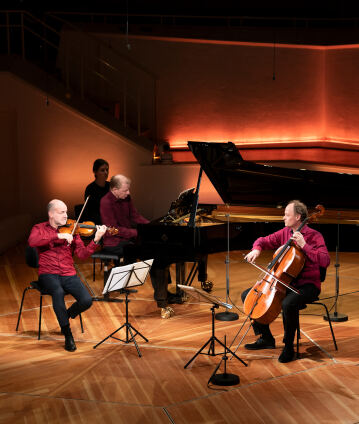The Feininger Trio with Schubert, Brahms, Zemlinsky and Gourzi

The Feininger Trio, named after the painter Lyonel Feininger, captivates with its warm and nuanced sound. Here it takes us to the Vienna of the Romantic and late Romantic periods – with Schubert’s soulful Notturno, Brahms’s C minor Trio suffused with Hungarian fire and Zemlinsky’s Opus 3, which is unmistakably orientated towards the Brahms tradition. A contemporary counterpoint to these is provided by Konstantia Gourzi’s Apollon.
As a young composer, Alexander Zemlinsky was notorious as a “Brahmin” because of his admiration for Johannes Brahms. He met the master in person shortly before his death: “It was not so easy to talk to Brahms,” Zemlinsky later recalled. “Questions and answers were short, brusque, seemingly cold and often very ironic.” But behind the hard shell was a soft core: Brahms recognised the young composer’s talent, offered him financial support and recommended him to his publisher Simrock. Zemlinsky’s fiery D minor Trio from 1896 pays tribute to his idol in its tonal language. Like Brahms’s op. 114, the original version of the work is written for clarinet, cello and piano.
Brahms composed his third and last piano trio in 1886 during a summer holiday in Switzerland. In this tightly conceived work, which is powerful in the outer movements, complex motif development and rhythmic subtlety meet folk elements: the second theme of the first movement is a waltz, and Brahms was inspired by the Hungarian Csárdás for the finale. His close confidante Elisabeth von Herzogenberg commented on the trio: “It is better than all photographs, and so it is the real picture of you.”
“I often feel an inner necessity to create new musical constellations that have to do with history and mythology,” explained Konstantia Gourzi about her composition Apollon, which she dedicated to the Feininger Trio. The seven short movements are assigned to the seven letters that make up the name of the Greek god. Each with an associative title – from “Identity” to “Breathing” to “Echo” –, the composer presents a wealth of dazzling sounds, tonal reminiscences and vocal passages.
© 2024 Berlin Phil Media GmbH